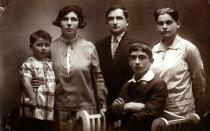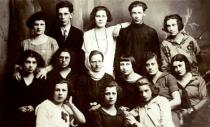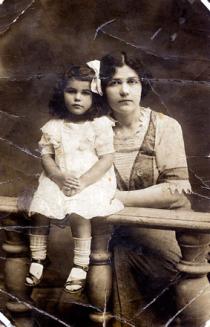Zuzanna Mensz and her friends Roza and Ania
This is a photo of mine and my friends Roza and Ania. I think this photo was taken in Kemerovo, where we spent two war years, also working in hospital. It could be 1942.
I met Roza and Ania in Poltava. We were working in military hospital in Poltava as nurses. They were students from Kiev, Jewish girls from Ukraine. They have become my lifetime best friends. Roza was a bit older, she'd already finished her studies. She vouched for me, because I doubt they would accept a Polish girl into a military unit. She introduced me to the second one, Ania, who was also in the group marching from Kiev to Poltava. That's how we've become friends. The three of us worked in a military hospital in Charkiv. We were like sisters, we shared everything. We lived together. Whenever one of us found out there was some extra food somewhere, she either let the others know or brought it home. We were young so we were always hungry.
We stayed in Charkiv for a month. Later the hospital was evacuated. They ordered that no women were to be sent to frontline units and so we were all transferred to Kemerovo in the Siberia. I spent the following two years there.
The hospital in Kemerovo was located in school buildings. It was large, consisted of two buildings. We only had one real surgeon, the rest were general practitioners. Everybody was retraining back then. I was told to put plaster casts. In Poland casts were applied by doctors and in Russia it was done by technicians. There was this girl in Kemerov, a very good plaster technician. Because there were two buildings they decided to create a second casting room and to put me in charge of it. I didn't have a clue about it but the girl taught me everything. To help me I was assigned a cleaning girl, Marusia, and a medical orderly who knew as much as I did. But I did learn and [the quality of] my casts was never questioned. It was a very tough work. Whole transports of wounded soldiers kept coming from the frontline, we had to remove all those pus-covered casts. They came all dirty, infested with lice. Whenever a train with the wounded came the personnel didn't sleep for a few days straight, until we brought them back to normal.

































